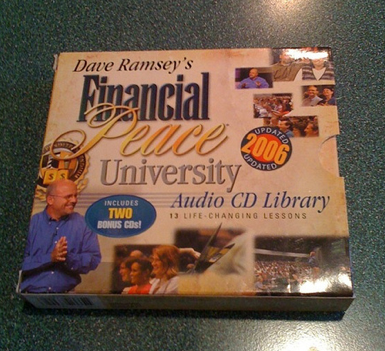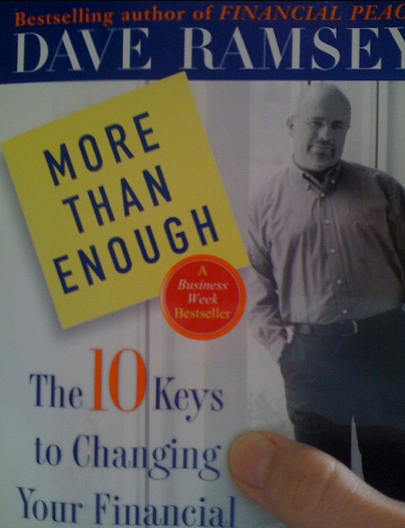Christian personal finance guru Dave Ramsey is buzzing on the Christian blogosphere once again after blocking blogger and seminarian James Bryant on Twitter. Bryant responded to a Ramsey “rant” about minimum wage. According to Bryant, who regularly listens to Ramsey’s radio program:
“Dave [said] people asking for higher wages in minimum wage jobs don’t deserve a higher pay — their economic value isn’t high enough. He drew a distinction between a person’s inherent and economic value. While the human has value, the market dictates someone’s economic value (and therefore their paid wage).”

CDs of Dave Ramsey’s “Financial Peace University.” Photo courtesy Bonnie Brown via Flickr Creative Commons.
Bryant reasonably suggested that he didn’t find this distinction anywhere in scripture. A terse Twitter debate (is there any other kind?) ensued. And then Bryant found that Ramsey blocked him.
Last year, Ramsey re-posted a list of “20 Things the Rich Do Every Day” — things like networking, exercising, and listening to audiobooks — that ‘poor people’ don’t do.
The post raised some concern, not least among some of my fellow writers over at the Christianity Today blog, her.meneutics. Presented without context or explanation, seemed to be yet another way of praising the rich while denigrating the poor — the very thing the Judeo-Christian scriptures urge people not to do.

A copy of a Dave Ramsey book. Photo courtesy Bonnie Brown via Flickr Creative Commons.
Ramsey was angered by our response, and that of many others, and had this to say:
“…some members of our culture are so doctrinally shallow and so spiritually immature that the reaction was often rude, inappropriate or outright abusive. This reaction is sad because it’s focused only on this one little list, not on our body of work.”
In particular, Ramsey objected to my contribution to the discussion (though he did not name me directly) in which I referred to developing world poverty. He said that the reality of poverty in poor countries is irrelevant to US poverty, because
“If you are broke or poor in the U.S. or a first-world economy, the only variable in the discussion you can personally control is YOU.”
That’s the bread-and-butter of Ramsey’s teaching. Of course it is: if financial success isn’t really within everyone’s grasp simply by following 5 or 10 principles and organizing one’s cash into little envelopes, Ramsey (estimated net worth: $55 million USD) wouldn’t have much of a product to sell.
But reporter Helaine Olen came out with a book last year that casts serious doubt on the advice of gurus like Ramsey and Suze Orman.
Ramsey, for example, says that Ramsey tells people, “You can choose not to participate in a recession.”
“By preaching this message,” Olen says, “[these gurus] encourag[e] people to not see their problems in a greater context. You don’t see yourself as part of a group, you see yourself as alone.”
(Why do the phrases “no man is an island” and “love your neighbor as yourself” keep running through my mind?)
In talking to a reporter with the New York Times, Olen described playing an online game called “Spent,” in which players attempt to make it to the end of the month on minimum wage — a sort of role-play of Barbara Ehrenreich’s wonderful book Nickel & Dimed.
Try playing the game yourself if you aren’t already acquainted with how the working poor in America live.
I’d like to see Ramsey play it.
But of course, I’m sure he’d just say it’s possible to choose not to participate.
(This Deseret News interview with Helaine Olen is VERY worth reading.)





